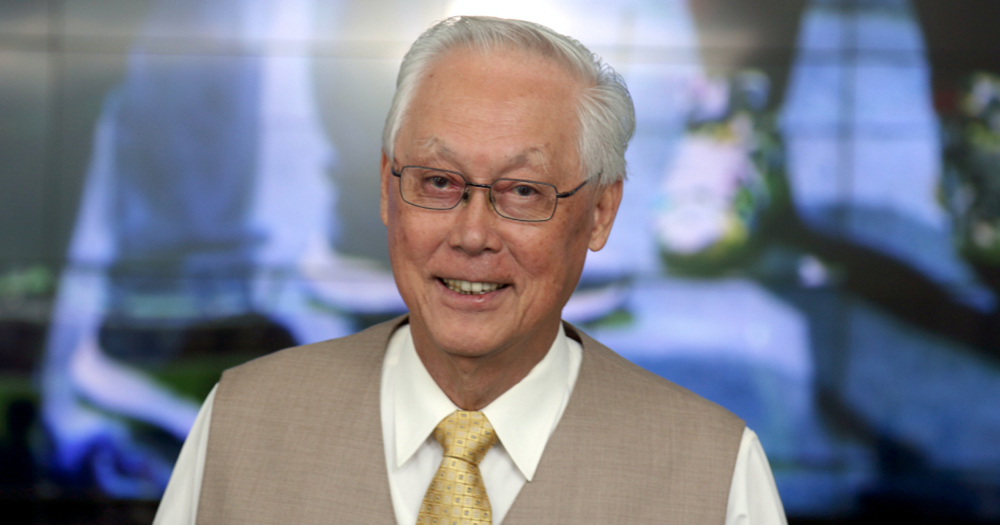The Non-Constituency Member of Parliament (NCMP) scheme has recently been the focus of some discussion among politicians.
A debate on the scheme ensued after PAP Tanjong Pagar GRC candidate Indranee Rajah, on June 29, highlighted the scheme as a reason why suggestions that opposition MPs have to be elected in order to have a voice in Parliament were "not correct".
Opposition politicians, such as WP candidates Dennis Tan and Yee Jenn Jong have also spoken up with critiques of the scheme.
Emeritus Senior Minister Goh Chok Tong, who recently announced his retirement as a Member of Parliament (MP), has weighed in on the issue as well.
Goh defends NCMP scheme
Goh, on July 4, wrote a lengthy post on Facebook explaining the NCMP and expounding on its "fundamental intent", which he said was to prevent unintended results while guaranteeing opposition voices in Parliament.
Origins of the scheme
Goh said that he, together with the late founding Prime Minister Lee Kuan Yew, were the "architects" of the scheme and explained how its creation was influenced by the experience of J B Jeyaretnam entering Parliament in 1981.
Jeyaretnam was the first opposition MP to be elected into Parliament after almost 17 years of PAP dominance since Singapore's independence.
The opposition presence in Parliament showed Lee (who was then the Prime Minister) that it was good to have "robust debates on government policies in Parliament", after seeing debates between Jeyaretnam and PAP backbenchers.
Goh also explained that opposition MPs in Parliament also allowed the ruling party to "debate and debunk issues" which, Goh said, "the opposition would otherwise raise outside".
Goh said that he and Lee, "never feared having checks-and-balances or alternative voices", and wrote in his post that the NCMP scheme was in fact created out of "our wish to guarantee them".
"Best Losers System" in Mauritius served as point of reference
In establishing the NCMP scheme, Goh and Lee took reference from the "Best Losers System" in Mauritius, which is used to ensure fair representation of ethnic minorities.
According to Goh, a number of seats in Mauritius's Parliament are reserved for the best losers from ethnic minority groups.
NCMP scheme prevents unintended election outcome
The NCMP scheme, Goh said, worked similarly to guarantee opposition voices in Parliament without weakening the mandate of the ruling party.
This reduces the probability that the ruling party would be voted out of office "when that is not really what the voters want".
Goh said that if Singaporeans were to vote for the opposition to ensure checks and balances in Parliament while still wanting the ruling party to form the government, an "unintended election outcome is entirely possible".
This would be different from Singaporeans exercising their political right to consciously vote to remove the ruling party from government, he added.
NCMP scheme a "stabiliser", not intended to "shut out the opposition"
As Goh pointed out in his post, the NCMP scheme does not prevent the ruling party from being "swept out of power", as the electorate can still vote them out. This, Goh said, showed that the NCMP scheme was not intended to "shut out the opposition and entrench the ruling party in power".
Instead, the scheme acts as a "stabiliser" in the context of Singapore's "first-past-the-post electoral system", Goh said, comparing it to an outrigger on a sampan that allows Singapore to move fast without fear of capsizing.
Changes to the NCMP scheme
Goh also made mention of changes to the NCMP scheme, which will be in effect from GE2020 onwards. Goh said that he had supported the changes.
The changes include increasing the number of NCMP seats from nine to 12, and giving NCMPs the same voting rights as elected MPs.
They were previously not able to vote on constitutional changes, supply bills, money bills, votes of no confidence in the Government, and removing a President from office.
"A winning hand for Singapore's democracy"
Goh's post concluded by stating that the NCMP scheme guarantees that the new Parliament will have at least 12 opposition MPs, which would be "a winning hand for Singapore's democracy".
Here is Goh's post in full:
Opposition MPs on the NCMP scheme
The WP, which took all three NCMP seats after the 2015 general election, has been critical of the scheme.
Former WP chief Low Thia Khiang compared NCMPs to "duckweed on the water of the pond", who, lacking "roots" in terms of a constituency and town council to operate in, are kept from discussing policies in a way that is grounded in the "realities of politics" that come from Meet-the-People sessions and running town councils.
More recently, WP's Dennis Tan and Yee Jenn Jong highlighted that NCMPs were not allowed to hold events in the constituencies where they had contested.
Yee, a former NCMP, said in a Facebook post that "the PAP will not take you seriously" even with voting rights, as the number of opposition MPs would still be "too few" to be able to change anything.
The Progress Singapore Party's Leong Mun Wai also questioned the intent behind the scheme, at a doorstop interview with the media on July 4 at Ayer Rajah Food Centre.
Suggesting that proportional representation would also be an "acceptable way of diversifying our Parliament", Leong said:
"If the government is serious about giving voices to the alternative camp, then they have to come out and say 'we will introduce proportional representation'."
Leong's suggestion of proportional representation echoed a question he posed to Deputy Prime Minister Heng Swee Keat in January, at this year's Singapore Perspectives conference.
Related stories:
Top image via MParader on Facebook
If you like what you read, follow us on Facebook, Instagram, Twitter and Telegram to get the latest updates.
